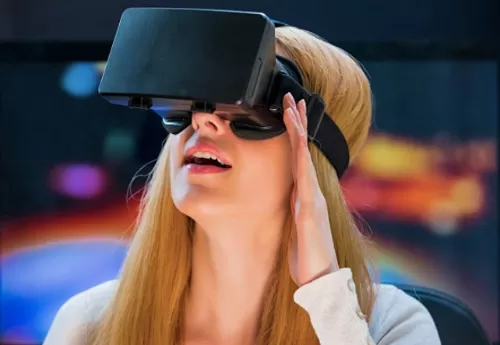A New Era of Interactive Experience
Virtual reality (VR) has emerged as a groundbreaking technology that has revolutionized the way we interact with digital content. With its immersive and interactive nature, VR has opened up new possibilities for entertainment, education, healthcare, and even business. In this article, we will explore the world of virtual reality and its potential impact on our lives.
Click to Get Big Benefits

Virtual reality is a simulated experience that can be similar to or completely different from the real world. It uses computer-generated imagery, sounds, and other sensory stimuli to create an environment that users can interact with in a seemingly real way. VR is achieved through specialized hardware, such as head-mounted displays (HMDs) and handheld controllers, which track the user's movements and adjust the VR environment accordingly.
Applications of Virtual Reality
1. Entertainment: VR has already made a significant impact on the gaming industry, allowing players to immerse themselves in virtual worlds and interact with game characters in ways that were previously impossible. VR also has the potential to transform other forms of entertainment, such as movies, concerts, and sports events, by providing audiences with a more engaging and personalized experience.
2. Education: VR has the potential to revolutionize education by creating immersive learning environments that enable students to explore complex concepts and interact with educational content in a more engaging way. For example, VR can be used to simulate scientific experiments, historical events, or travel experiences, making learning more accessible and enjoyable for students of all ages.
3. Healthcare: VR has been shown to have therapeutic benefits for patients with various conditions, such as anxiety disorders, chronic pain, and post-traumatic stress disorder (PTSD). By providing patients with a safe and controlled environment to confront their fears or practice relaxation techniques, VR can help them overcome their symptoms and improve their overall well-being.
4. Business: VR has the potential to transform many industries by enabling companies to create virtual prototypes, conduct remote meetings, and train employees in a realistic and cost-effective way. For example, architects and engineers can use VR to design and test buildings before they are constructed, while businesses can use VR to simulate customer interactions and improve their products and services.
Challenges and Future Prospects
Despite its many potential benefits, VR still faces several challenges, including high costs, technical limitations, and concerns about the long-term effects of prolonged VR exposure on human health. However, as the technology continues to evolve and become more accessible, it is likely that VR will become an increasingly important part of our daily lives.
In conclusion, virtual reality is a powerful technology that has the potential to transform the way we interact with digital content and each other. As VR continues to evolve and mature, it will undoubtedly open up new possibilities for entertainment, education, healthcare, and business, making our lives more immersive, engaging, and fulfilling.

All News
- Dentistry
- Lawyer
Others
- Terms of use
- Privacy Policy
- About Us
